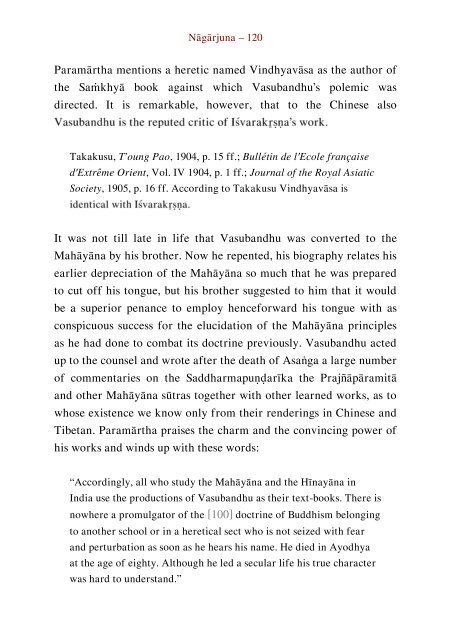Literary History of Sanskrit Buddhism
A study by J. K. Nariman of Sanskrit Buddhism from the Early Buddhist Tradition up to the Mahayana texts proper.
A study by J. K. Nariman of Sanskrit Buddhism from the Early Buddhist Tradition up to the Mahayana texts proper.
You also want an ePaper? Increase the reach of your titles
YUMPU automatically turns print PDFs into web optimized ePapers that Google loves.
Nāgārjuna – 120<br />
Paramārtha mentions a heretic named Vindhyavāsa as the author <strong>of</strong><br />
the Saṁkhyā book against which Vasubandhu’s polemic was<br />
directed. It is remarkable, however, that to the Chinese also<br />
Takakusu, T’oung Pao, 1904, p. 15 ff.; Bullétin de l'Ecole française<br />
d'Extrême Orient, Vol. IV 1904, p. 1 ff.; Journal <strong>of</strong> the Royal Asiatic<br />
Society, 1905, p. 16 ff. According to Takakusu Vindhyavāsa is<br />
It was not till late in life that Vasubandhu was converted to the<br />
Mahāyāna by his brother. Now he repented, his biography relates his<br />
earlier depreciation <strong>of</strong> the Mahāyāna so much that he was prepared<br />
to cut <strong>of</strong>f his tongue, but his brother suggested to him that it would<br />
be a superior penance to employ henceforward his tongue with as<br />
conspicuous success for the elucidation <strong>of</strong> the Mahāyāna principles<br />
as he had done to combat its doctrine previously. Vasubandhu acted<br />
up to the counsel and wrote after the death <strong>of</strong> Asaṅga a large number<br />
<strong>of</strong> commentaries on the Saddharmapuṇḍarīka the Prajñāpāramitā<br />
and other Mahāyāna sūtras together with other learned works, as to<br />
whose existence we know only from their renderings in Chinese and<br />
Tibetan. Paramārtha praises the charm and the convincing power <strong>of</strong><br />
his works and winds up with these words:<br />
“Accordingly, all who study the Mahāyāna and the Hīnayāna in<br />
India use the productions <strong>of</strong> Vasubandhu as their text-books. There is<br />
nowhere a promulgator <strong>of</strong> the [100] doctrine <strong>of</strong> <strong>Buddhism</strong> belonging<br />
to another school or in a heretical sect who is not seized with fear<br />
and perturbation as soon as he hears his name. He died in Ayodhya<br />
at the age <strong>of</strong> eighty. Although he led a secular life his true character<br />
was hard to understand.”


















